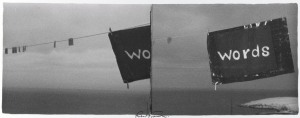“A voice comes to one in the dark. Imagine.
…Deviser of the voice and of its hearer and of himself. Deviser of himself for company. Leave it at that. He speaks of himself as of another. He says speaking of himself, He speaks of himself as of another. Himself he devises too for company. Leave it at that. Confusion too is company up to a point. Better hope deferred than none. Up to a point. Till the heart starts to sicken. Company too up to a point. Better a sick heart than none. Till it starts to break. So speaking of himself he concludes for the time being, For the time being leave it at that” – Samuel Beckett, Company
“The words spoke by themselves. The silence entered them, an excellent refuge, since I was the only one who noticed it.” – Maurice Blanchot, The Madness of the Day
So, speaking of himself, I only noticed it.
The small furry animal, almost humming in its purr, he had chance, so he thought, to please, to comfort, with a pet, a scratch, an acknowledgment, tender, while it butted and marked itself against him. The illusion. A kind of company in itself (or to).
The ungrammaticality of occurrences. Of happening. What happens to be. Or is not. When speaking to himself. Without voice. I was the only one, as far as I am able to tell – if in fact this is telling – who noticed it. It seems words speak of themselves. From elsewise and through whom. He says, speaking of himself (or to). Without voice.
Devising. Illusion. I devise, he says, speaking to himself, of himself, without voice. Seeking – is he? – Am I? – Seeking…company?
A small child (another illusion, devised) passes by, walking a young dog and waving a nod of sorts – I don’t remember which, he says, but I returned a gesture and obtained a moment of calm in the chilly Autumn breeze. There was a sun full of color due to the leaves in their change, and fall, and flutter (due to the nothing-shaped wind). But what seemed a moment of warmth, of calm, devised by a child with a dog and a friendly (fearful) gesture, he thought (speaking of himself without voice), I was the only one who noticed it.
I take to reading then – others speaking of themselves without voice (or beyond it) – in order to devise… company? he wonders of himself, to himself. For when reading, it surely seems the words are speaking only of themselves, no matter who pens them. Such the character of the texts he chooses (I thought of myself, to myself, or an other I devised as myself, like puppets). And in part read and read for the experience or feeling that I alone notice it. That I might in fact provide the company I devise, yet hardly able to tell since I have not penned the words but merely notice – borrow, listen? (there are no voices) – the words seem to speak of themselves. Without voice. (He said of himself, devising). Something like company. Perhaps.
Even in the color-filled sunlight of Autumn days, I at times experience myself as being quite deeply in dark, he says speaking of himself, myself, devising voices, soundless, out of words that seem to be speaking only of themselves and their variegated histories and usages, and billions of potential speakers and hearers and interpreters – creators and devisers – filled with ambiguity and application. Here with me on shavings of dead trees, providing stark living contrast to Winter’s day-night. I get confused, he says speaking of himself. Confusion too is company devised, up to a point, I suppose. Obviously “fusion-with” implies an other, perhaps enough, I said, speaking to myself, without voice, here on dead leaves in black scars. In mutilation. Transgression. Inscription. Perhaps the words will speak of themselves and some other “I” will claim to be the only one that notices.
A strange delusion of company indeed. He says speaking of himself, devising a voice, its hearer, and an himself as participant and therefore a company to keep.
Reading: “only a detour is adequate” (Agamben), and “in pursuing meaning we are pursuing our limits” (Allen), and was perhaps meaning a synonym or metaphor, simile or metonymy for company he thought, speaking to himself, without voice. But with an illness, diagnosed by doctors – those scientific political powers responsible for providing facts or devising happenings, pronouncing occurrences – so in any case he is not alone, being-with his illness, I thought, speaking to myself in an absence of sound. The words spoke by themselves.
Other things as well: the furry animal, its humming purr, its actions; the trees, the leaves, the wind, the light. The child, the dog, the gestures. The books, the authors, the words themselves. Divisors of voices, of hearers, of selves. Sick hearts, confusion, and company. Am I the only one who notices? he says speaking of himself, speaking of himself as another.
So speaking of himself he concludes for the time being, For the time being leave it at that.” – Samuel Beckett


Yes.
I often ask that same question: am I the only one who notices? Am I the only one who sees the leaves just so, who listens to the children laugh just so, who tastes the wind just so? Who else notices, but me, and who else is there to hear my thoughts, but me?
Jolly well written. I wonder if this is the sort of thing Jung meant when speaking of how “we slip, imperceptibly, into a conceptual world”. He wasn’t just meaning now and again.
exile… exhale
so close and yet….